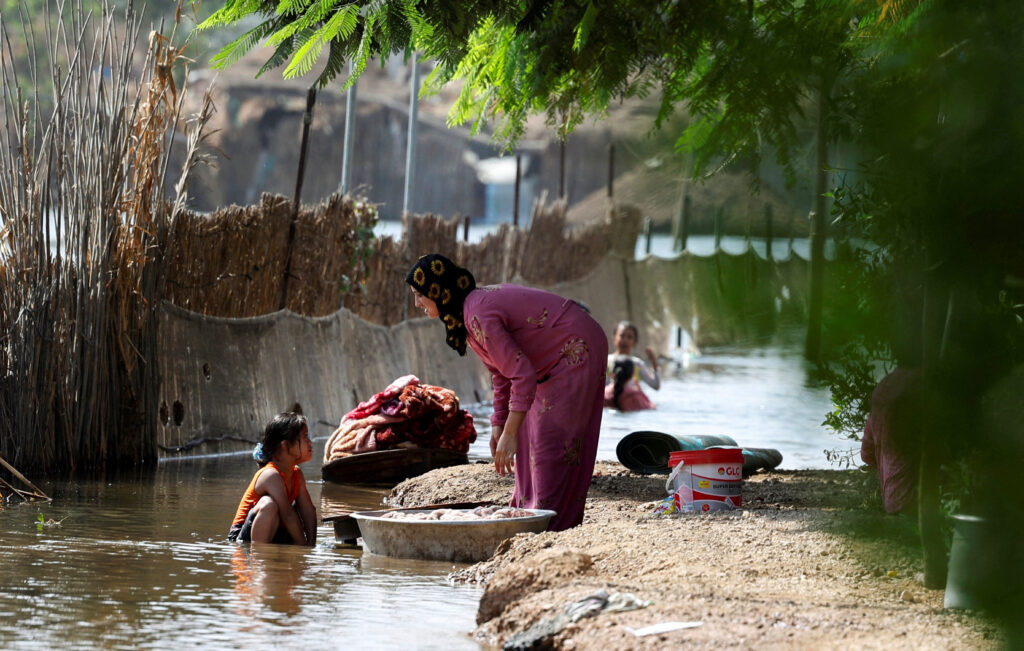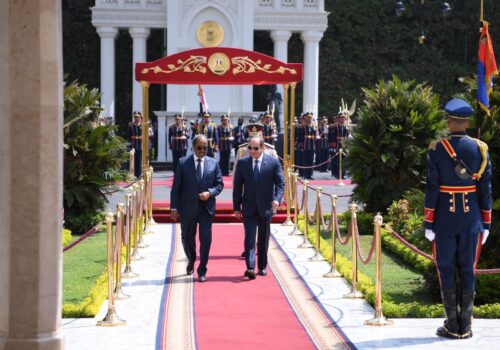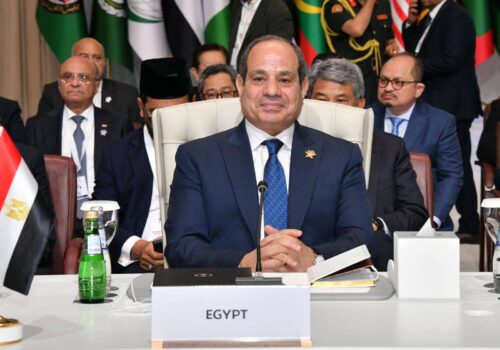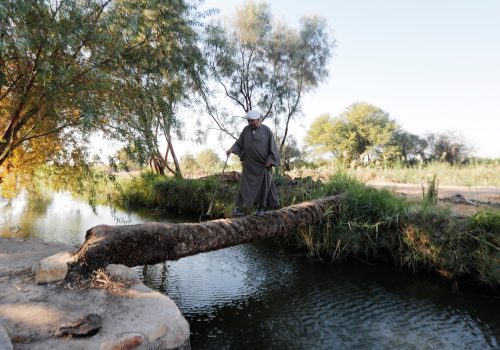Transboundary river basins function simultaneously as ecological systems and arenas of geopolitical negotiation. Water flows across borders, but sovereignty and water governance do not. This enduring contradiction has long defined relations among the Nile Basin states—specifically Egypt, Sudan, and Ethiopia.
Those defining lines of tension were this month underscored at a pivotal moment for the region. Intense rainfall over the Ethiopian Highlands this month triggered severe flooding in several northern Egyptian governorates, including Beheira, Kafr el-Sheikh, and Menoufia.
The floods triggered renewed hostility over Ethiopia’s Grand Ethiopian Renaissance Dam (GERD). Ethiopia presents the GERD as a developmental milestone aimed at poverty reduction and energy self-sufficiency. For Egypt and Sudan, however, the project’s unilateral management represents an existential risk.
Egypt’s Ministry of Irrigation blamed Ethiopia for “reckless dam management,” claiming that abrupt water discharges from the GERD exacerbated the recent surge in floodwaters. Addis Ababa—having formally inaugurated the dam only weeks earlier, on September 9—countered that operations followed technical protocols and mitigated what would otherwise have been worse flooding in Sudan. This episode underscores how data opacity fuels political mistrust.
The latest escalation coincides with a renewed diplomatic shift. In a recent interview with Al Arabiya Arabic, Massad Boulos—senior adviser to US President Donald Trump on African, Arab, and Middle Eastern Affairs—stated that Washington now supports a “technical, not political” approach to the GERD dispute. According to Boulos, “the GERD issue must be resolved through technical means, not political pressure,” a position that signals a recalibration of US engagement and places the emphasis on data transparency, operational coordination, and joint risk mitigation rather than on coercive diplomacy.
Cairo warned more than once that rapid filling or uncoordinated water releases could sharply reduce downstream flows, disrupt irrigation, and even increase flood risk during heavy rains—challenges that pose real risks for a deeply water-stressed country.
The GERD and Egypt’s water stress
Costing roughly five billion dollars, located fourteen kilometers from the Sudanese border, and designed to hold 74 billion cubic meters of water, the GERD represents Africa’s largest hydroelectric plant. Following the fourth and final filling in September 2023, Addis Ababa declared the dam fully operational, doubling national power capacity and consolidating its ambition to become a regional energy hub.
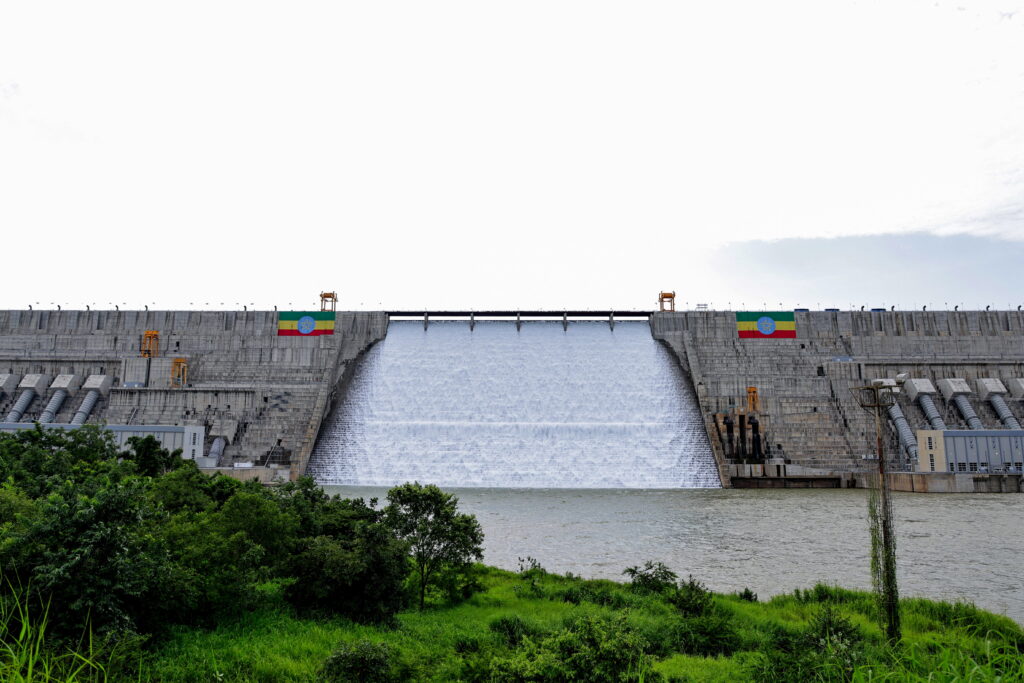
The hydrological risks of the project for Egypt’s Delta are both immediate and structural. In the short term, large or poorly coordinated releases from upstream reservoirs can overwhelm outdated drainage systems, provoking floods and disrupting irrigation cycles. In the medium to long term, a new operational regime at GERD will alter seasonal flow patterns, affecting groundwater recharge and salinity levels, and challenging agriculture and infrastructure alike. Without transparent data-sharing and coordinated management, Cairo will struggle to anticipate these shifts.
With over 118 million people and relying on the Nile River for nearly 97 percent of its freshwater, the Nile represents not merely a resource but Egypt’s national bloodstream. Average water availability per person has declined from almost 1,900 cubic meters in 1959 to fewer than six hundred today—well below the United Nations’ water-poverty threshold—and is expected to fall below five hundred by 2050, signaling an absolute water scarcity level. Climate change, sea-level rise, and irrigation inefficiencies compound these pressures, placing food production and social stability at risk.
Cairo, therefore, faces a dual challenge: modernizing its irrigation and drainage infrastructure while preventing upstream states from restricting flows. Meanwhile, Ethiopia—despite contributing 86 percent of the Nile’s waters—remains among the world’s lowest in water-use capacity, struggling with recurrent droughts and power shortages.
Historical legacies and legal asymmetries
The current diplomatic crisis cannot be understood without recalling colonial-era water agreements between Egypt and Sudan. The 1929 British-brokered Nile Waters Agreement granted Egypt 48 billion cubic meters per year and Sudan 4 billion, along with Cairo’s veto over upstream projects—an agreement negotiated solely between Egypt, Sudan, and their former colonial power, the United Kingdom. Ethiopia was never a party to this treaty and has consistently rejected its legitimacy, arguing that no upstream state can be bound by colonial-era arrangements in which it had neither representation nor consent. The 1959 Egypt–Sudan accord reinforced this asymmetry, allocating about 84 percent of the river’s flow (55.5 billion for Egypt and 18.5 for Sudan) and creating a joint commission to oversee water management between these two countries—again without Ethiopian participation. Addis Ababa regards both treaties as legally irrelevant and historically obsolete.
For decades, these treaties anchored Egypt’s claim to “historic rights,” while upstream countries rejected them as colonial relics. The result is a structural mismatch between legal legitimacy and hydrological reality: Upstream states see their development prospects as constrained, while Egypt perceives any alteration in river flow as an existential threat.
But structural tensions escalated with Ethiopia in 2011 when Addis Ababa launched construction of the GERD. Years of negotiations mediated by the African Union, the United States, and the World Bank have yet to yield a binding trilateral agreement, leaving both hydrological and political uncertainty unresolved and tensions high among these states. In this context, water management has become inseparable from national security, energy policy, and regional diplomacy.
Ethiopia insists that dam operations follow seasonal hydrology and turbine requirements, while Egypt argues that opaque management violates the 2015 Declaration of Principles on equitable use of Nile waters. From a geopolitical and security perspective, the return of tensions among these states confirms the reemergence of hardened positions and the risk of a prolonged hydropolitical confrontation. Addis Ababa continues to argue that the GERD symbolizes a new order based on equitable development and regional interdependence, rather than dominance. Yet, this new order still lacks a legal and technical framework acceptable to all. No binding agreement exists on how the dam will be filled and operated during droughts or flood years, leaving each side vulnerable to the other’s decisions.
Sociopolitical tensions further magnify these physical risks. Recurrent floods and perceived external threats to national water security could exacerbate domestic grievances, fuel nationalist rhetoric, and push policymakers toward confrontational postures—including legal or, in extreme cases, military options. Indeed, Egypt has repeatedly framed control over Nile waters as an existential issue and has at times indicated that it would consider armed intervention if upstream dam operations were to threaten downstream flows.
Recommendations
Today, three overlapping deficits continue to undermine Nile Basin governance: a technical deficit (lack of real-time data on releases and inflows), an operational deficit (absence of agreed rules for drought or flood management), and a political deficit (mutual distrust and competing national narratives). The recent floods starkly reveal the cost of these gaps. Egypt’s repeated assertion that the Nile constitutes a “red line” underscores how water security remains inseparable from national sovereignty, making compromise politically difficult.
Cairo should consider a strategic path forward from this dilemma, based on a dual approach.
On the one hand, it must intensify external engagement—pursuing legal and diplomatic efforts through mechanisms such as the International Court of Justice, which reframes the dispute in legal rather than existential terms, while sustaining negotiations under the African Union (regional legitimacy) and the United States (one of the few external actors able to exert leverage on all three capitals).
Representatives of Egypt, Sudan, and Ethiopia will establish an independent trilateral technical commission under African Union oversight to analyze hydrological data and develop predictive flood models. At the same time, an integrated early-warning system that interconnects the existing hydrological, meteorological, and dam-operation monitoring platforms in Ethiopia, Sudan, and Egypt—allowing real-time data sharing and coordinated response to droughts, floods, and irregular water releases—would help avert humanitarian crises and improve coordination during extreme weather events. Equally important is the negotiation of legally binding operational guarantees—however minimal—that can anchor political trust in measurable hydrological parameters. International partners, including the United States, have promoted technical confidence-building measures designed to calm tensions, such as installing automated flow gauges and satellite-based monitoring to increase transparency. Yet such measures will build trust only if embedded within a political framework for data sharing and collaborative drought management.
On the other hand, Cairo should prioritize domestic adaptation by investing in water efficiency, desalination, and drainage upgrades to enhance resilience regardless of upstream actions. Egypt must accelerate its adaptation efforts by upgrading drainage infrastructure, modernizing pumping stations, and expanding agricultural insurance schemes to protect vulnerable communities. Ultimately, international diplomacy should be reframed toward the goal of shared resilience, encouraging Ethiopia to view coordination as an expression of responsible sovereignty, rather than an externally imposed constraint.
The recent floods serve as a warning: Technical cooperation cannot remain hostage to political rivalry. Whether the GERD becomes a driver of regional integration or a lasting fault line will depend on how quickly riparian states shift from mutual accusations to shared management. The alternative—a future of recurrent floods, escalating mistrust, and securitized water politics—would threaten not only livelihoods in the Nile Delta but also the broader stability of the Horn of Africa and the Eastern Mediterranean.
Alessia Melcangi is a nonresident senior fellow at the Atlantic Council’s Rafik Hariri Center and Middle East Programs. She is also an associate professor of contemporary history of North Africa and the Middle East at the Sapienza University of Rome, an associate research fellow at the Italian Institute for International Political Studies in Milan, and a member of the scientific committee of the Fondazione Med-Or Leonardo SpA in Rome.
Further reading
Thu, Sep 19, 2024
Egypt is cozying up to Somalia to thwart Ethiopia
MENASource By Shahira Amin
Tensions between Egypt and Ethiopia have escalated after Cairo forged closer ties with Addis Ababa's rival, Somalia.
Thu, Oct 9, 2025
Amid Gaza cease-fire hope, where does the Egypt-Israel relationship stand?
MENASource By Shahira Amin
Israel’s Doha strike shifted the dynamics with Cairo—stemming from concerns that Egypt may be next in Israel's crosshairs.
Wed, Jun 2, 2021
Egypt has a water problem—and no, it’s not only the GERD
MENASource By
The Nile River, a once seemingly unending water resource serving Egypt as a dependable and mighty lifeline for millennia, now barely reaches the Mediterranean Sea.
Image: A woman and child wash clothes near their flooded home in Dalhamo Village, near the Delta city of Ashmoun, in Menoufia Governorate, Egypt, October 5, 2025. Egypt's Prime Minister Mostafa Madbouly said the government had anticipated the rise in water levels, which coincides with the flood season and Ethiopia's inauguration of its dam. He said higher-than-usual discharges are expected until the end of October, adding that the flooded areas in Menoufia and Beheira are part of the Nile's flood zone and have been encroached upon by some citizens. REUTERS/Mohamed Abd El Ghany
